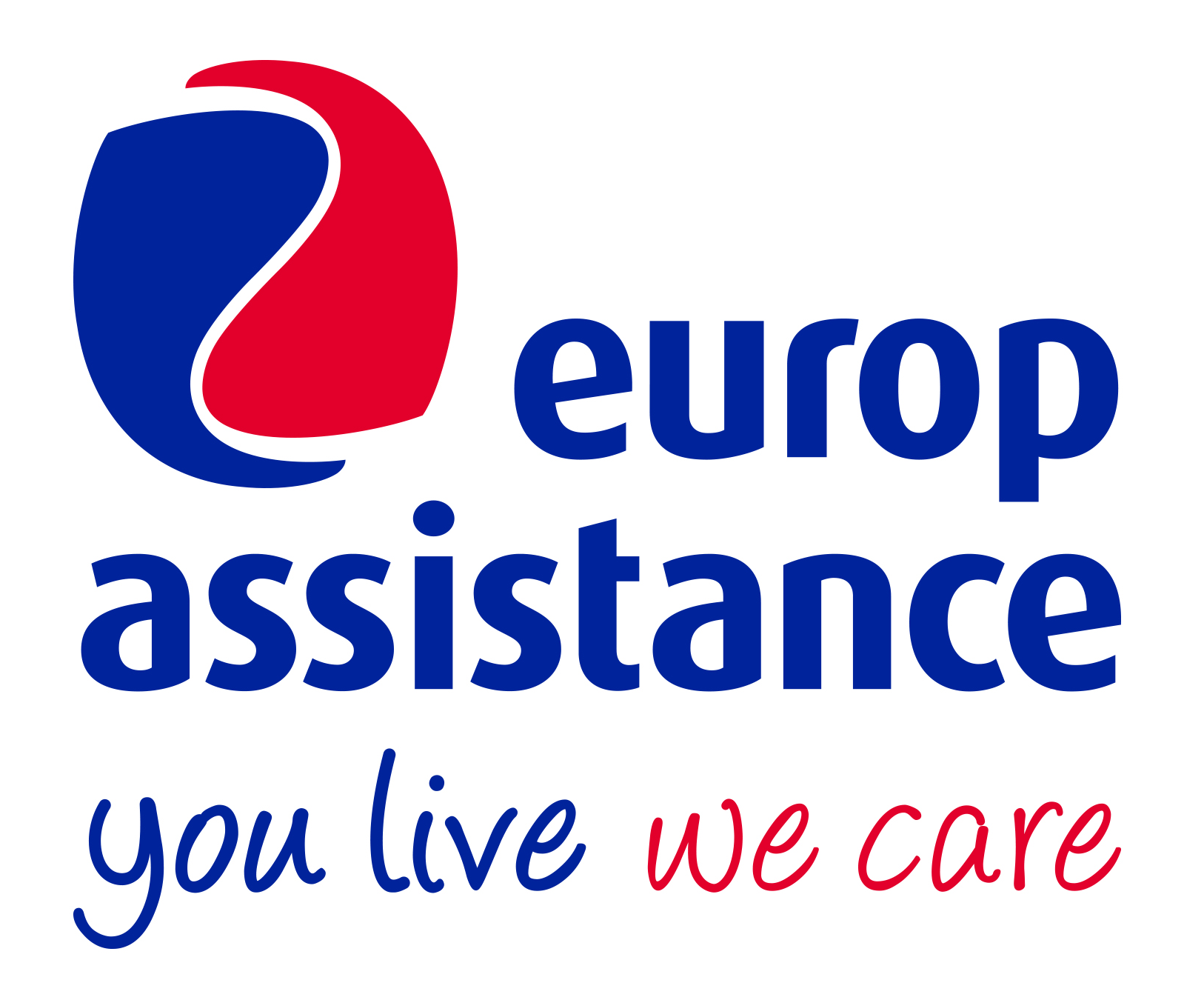A significant rebound in consumer intention to travel: 71% of Europeans will be traveling this summer
Key takeaways
-
72% of Europeans feel “really excited to travel” or “happy to travel” this year; overall, with 71% of Europeans intending to travel during the summer, which represents a +14pts increase compared to 2021.
-
Holidaymakers are spending more money this summer: they report a higher travel budget this year than they did in 2021, with average levels increasing around +20%..This remains lower than pre-pandemics levels.
-
This leads to return to a number of pre-Covid travel habits, such as:
-
Appeal of travel abroad increasing significantly: 48% (+13pts) of Europeans, 36% (+11pts) of Americans and 56% (+7pts) of Thais intend to travel abroad this summer. Nevertheless, domestic travel remains at higher level than 2019 in almost all the countries.
-
City adventures are popular again: they appear as the most popular type of destination for North Americans. o Hotels continue to be the preferred choice for accommodation (52% of holidaymakers in US, 46% / +9pts in Europe) while vacation rentals remain attractive (30% in Europe, 20% in USA).
-
Air travel is back: Europeans will use their car less than last year (55%, -9pts) and favor air travel (33%, +11pts). Same goes for Americans, in more balanced proportions (48%, -7pts vs 43%, +5pts).
-
People are back to planning vacation ahead of time, rather than leaving it till last minute: only 22% of Europeans have not yet decided on their destination (-10pts vs last year).
-
-
Covid-19 is no longer the first concern for European and North American travelers, overpassed by both inflation and personal / family reasons concerns.
-
Concerns about inflation and price increases are much present in peoples’ mind: financial considerations are mentioned as one of the main reasons not to travel by 41% of Europeans who won’t be going on a trip this summer (+14pts vs 2021), 45% of Americans (+9pts) and 34% of Thais (+10pts).
-
With an ever-growing awareness of travel-related cancellations and health concerns, Covid-19 has transformed travel insurance purchases into a durable trend that should continue well beyond the pandemic period.
Travel expectations are increasing significantly compared to last year, with levels often higher than in 2019
After two years of restrictions, international holidaymakers show strong enthusiasm to travel this summer: 72% of Europeans feel “really excited to travel” or “happy to travel” this year. Austrians, Swiss and Spaniards are the ones who show the most excitement (around 4 out of 10 who says they are even very excited).
Overall, 71% of Europeans intend to travel during the summer, which represents a 14 point increase compared to 2021. The most important changes are observed in Spain (78%, +20 pts), Germany (61%, +19 pts), Belgium (71%, +18 pts) and in the United Kingdom (68%, +18 pts).
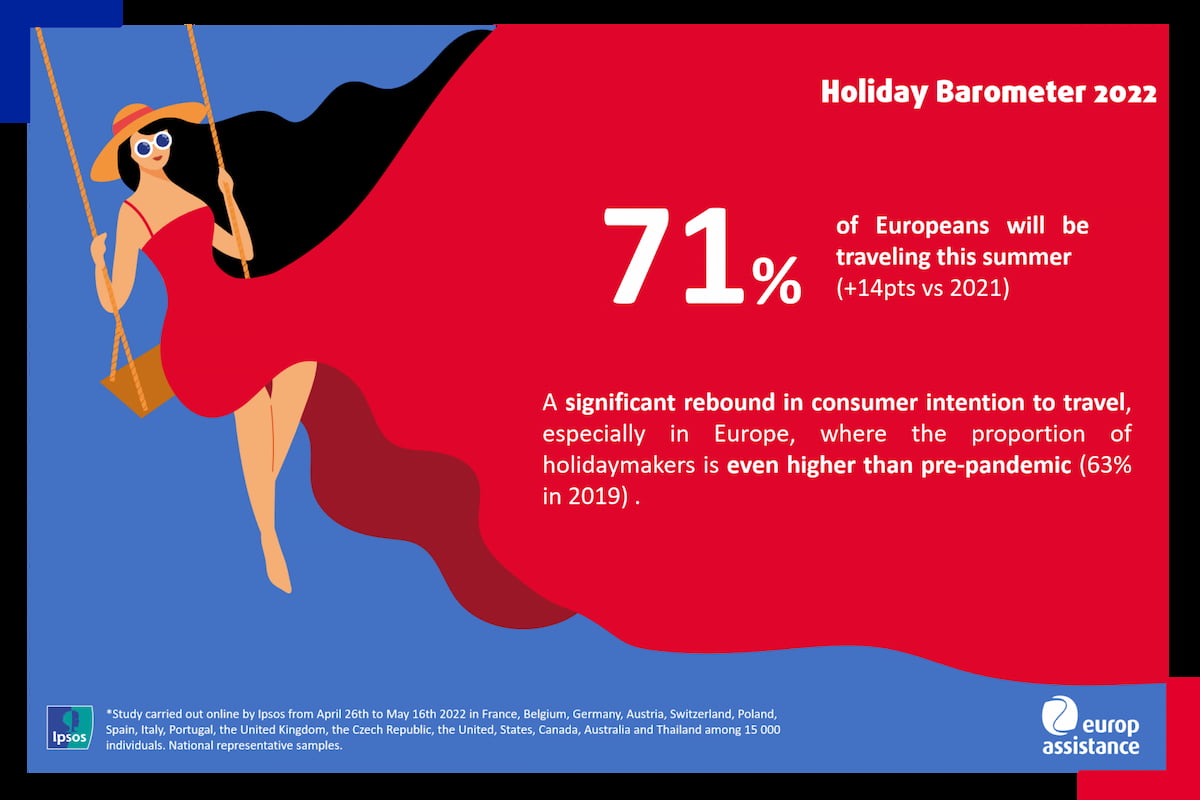
The proportion of holidaymakers in Europe is even higher than pre-pandemic (around 63%-64% in 2017, 2018 and 2019, +8/9 pts), except for Germany. The evolutions are particularly impressive in Portugal, Spain, Italy, Poland and Switzerland.
More Europeans expect to take trips than North Americans (60% in the US, +10pts; 61% in Canada) or Thais (69%, +25pts).
Average summer holiday budget should be higher than in 2021, but this increase is limited by inflation
Holidaymakers will have a bigger travel budget this year than they did in 2021: Americans intend to spend an additional $440, for a total budget of around $2,760 (+19% vs 2021). In Europe, the expected holiday budget is around €1,800 (+220€, +14% vs 2021). The budget increase compared to 2021 is particularly important in Spain (+20%), Germany, Portugal and Belgium (+15%).
However, the average holiday budget remains lower in most countries than it did in 2019: around €400 lower in France, €300 in Spain and €340 in Germany for instance.
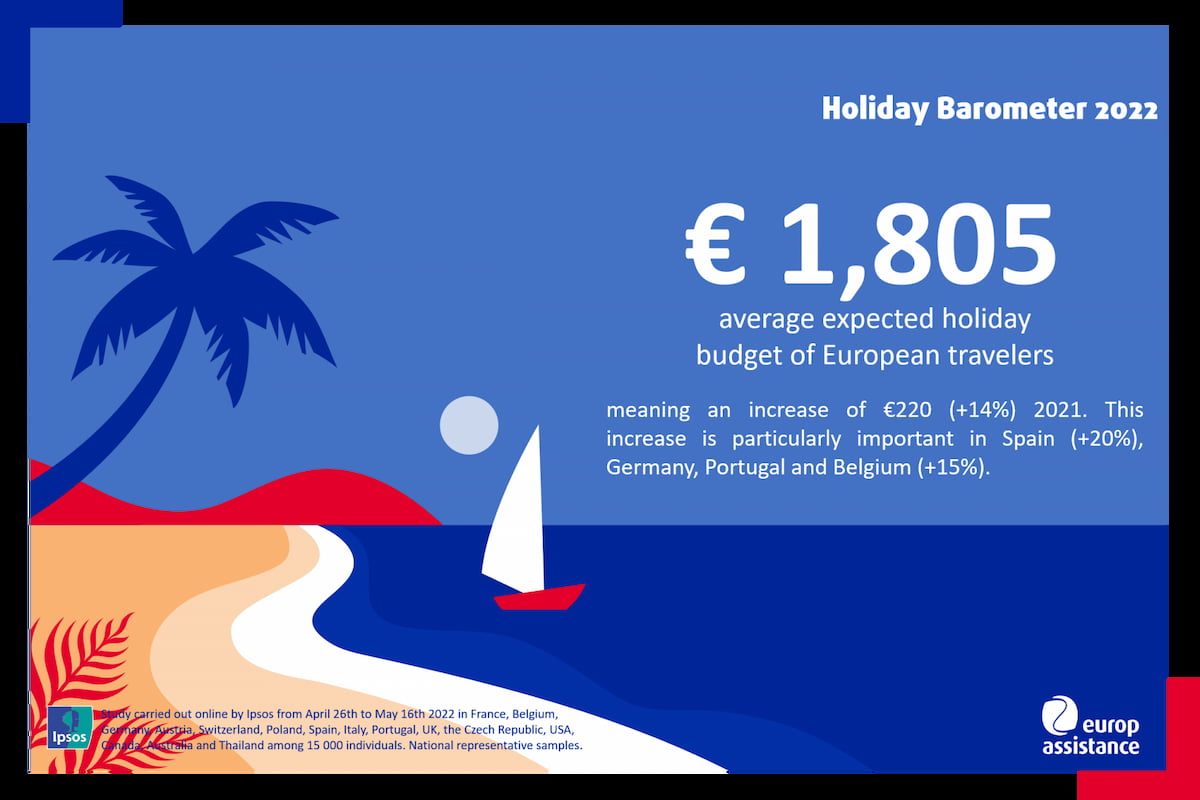
Concerns about inflation and price increases are impacting holidaymakers and their desire to travel: it is the case for 69% of Europeans, 62% of Americans, 70% of Canadians, 63% of Australians and 77% of Thais. Furthermore, financial considerations are mentioned as one of the main reasons not to travel by the 41% of Europeans who won’t be going on a trip this summer (+14pts vs 2021), 45% of Americans (+9%) and 34% of Thais (+10pts).
While COVID-19 is still a consideration for travelers, it has receded as a concern
The global level of concern regarding all COVID-19 related topics has strongly decreased compared to last year, especially for travel and leisure plans. The level of caution decreased significantly when it comes to considering avoiding crowded places (-18pts in Europe, -16pts in USA) or airports during a trip.
This decrease in COVID-19 related concerns led to a boost for cities, which are now the most popular type of destination for North Americans (44%, +9pts). In Europe, cities remain far behind the seaside (26% vs 60%) but come ahead of the countryside and mountains as a travel destination.
This decrease also boosts the demand in hotels in Northern America and Europe, as the part of holidaymakers mostly planning to stay in this kind of accommodation raises by +9pts in Europe (46%) and by +4pts in USA (52%). Hotels remain the preferred type of accommodation for holidays in these two areas. The part of vacation rentals remains stable.
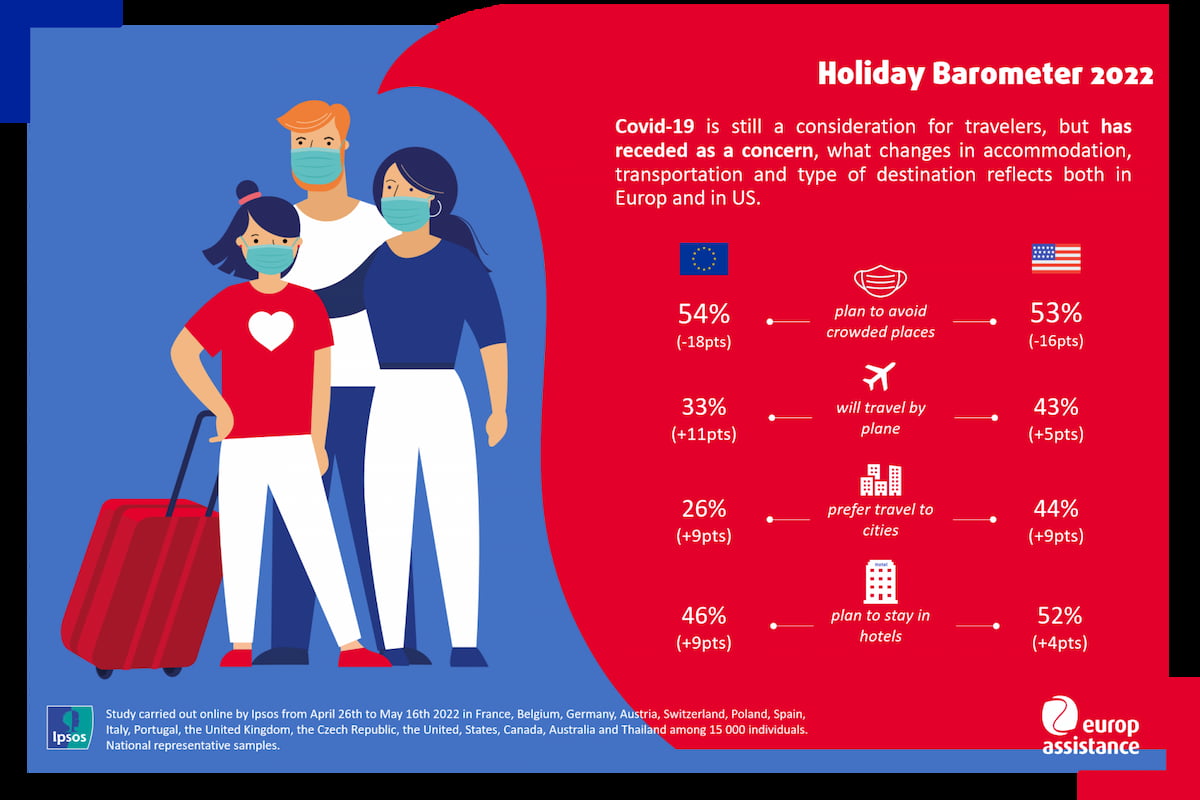
That said, 53% of Europeans and 46% of Americans said that COVID-19 has had an impact on their enthusiasm for travel. It is particularly high among the Canadians or the Australians (60%) and even more among the Thai population (81%). People around the world share that they will probably avoid travelling in certain countries (63% of the Europeans for instance), favor close destinations (54%) or that they will avoid flying and going to airports (38%).
In almost all countries observed, the average level of early booking rose, with far more people booking their holidays sooner than last year.
COVID-19 may also have impacted long-term travel insurance habits, as greater protection with travel insurance is the travel habit that appears to be the most durable in almost all countries surveyed. These levels are particularly high in Asia Pacific (Thailand 75%, Australia 54%), in UK (49%) or in Southern Europe (Spain 50%, Italy and Portugal 45%).
A Boost in International Travel
Compared to last year, holidaymakers are less undecided when it comes to their summer trip destination with only 22% of Europeans having not yet decided (-10pts vs last year).
Above all, a return to international travel is observed in all the countries: 48% (+13pts) of Europeans, 36% (+11pts) of Americans and 56% (+7pts) of Thais intend to travel abroad this summer. It is particularly the case in the countries where holidaymakers are more used to travel abroad: British (+24 pts abroad), Swiss (+7pts) and Belgians (+7pts) will leave home and head abroad.
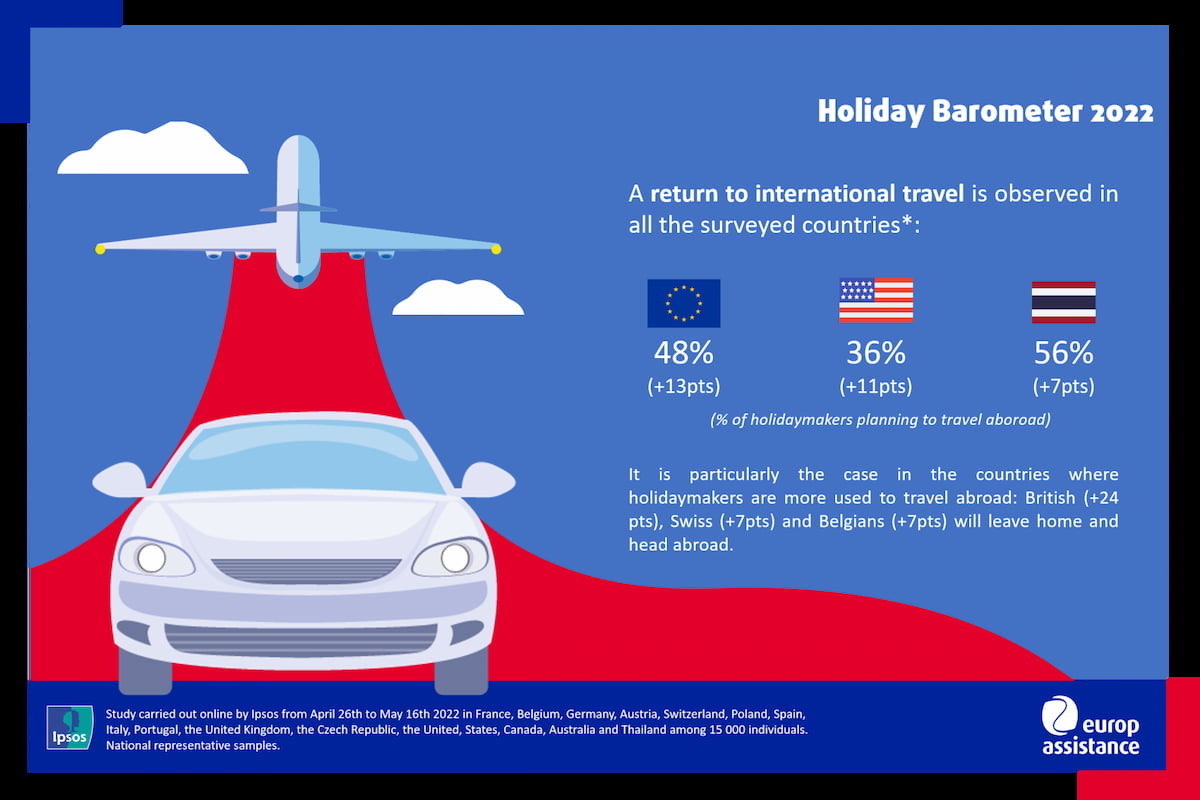
In some countries, the proportion of holidaymakers that will stay in their own country remains stable compared to last year: populations that traditionally stay within their borders will be maintaining this trend. It will be the case for 65% of Italians, 59% of Spaniards, 56% of French and 54% of Portuguese. While domestic travel in UK (-10pts), Switzerland (-8pts) and Belgium (-5pts) decreased.
As international travel increases, holidaymakers will adjust their mode of transportation. Overall, the two favorite means remain the car and the plane. However, Europeans will use their car less than last year (55%, -9pts) and favor air travel (33%, +11pts). The same applies for Americans, in more balanced proportions (48%, -7pts vs 43%, +5pts). Train or bus are still used by a minority of the population: less than 15% of the Europeans and less than 10% in other continents.
Back to normal?
When asked about the return to “normal conditions” of travel, perceptions vary considerably from one country to another. Thais, Australians and Austrians are the most pessimistic, with half of the population thinking situation will come back to normal only in 2024, with some respondents indicating it may be later, or even never. On the contrary, Poles, Czech and Swiss are the most optimistic, with nearly 4 out of 10 saying a return to normal travel is already possible.
But COVID-19 may have changed habits for the working population. Around a quarter to one third of the active population declare that they will be working from a holiday location during the summer aka a “workation”. It is particularly true among Portuguese (39%), Americans (32%), Poles (32%) and Australians (31%).
|
About Europ Assistance Group Founded in 1963, Europ Assistance, the inventor of assistance, supports customers in over 200 countries and territories thanks to our network of 750,000 approved providers and 43 assistance centres. Our mission is to bring people or corporates from distress to relief – anytime, anywhere. We provide roadside assistance, travel assistance and insurance, as well as personal assistance services such as the protection of the elderly, the protection of digital identity, telemedicine and the Conciergerie. The vision of our 10,000 employees is to be the most reliable care company in the world. Europ Assistance is part of the Generali Group, one of the world’s leading insurers.
|
About this study
The 2022 edition of the Holiday Barometer from Europ Assistance and Ipsos was conducted in 15 countries including the United States, Canada, United Kingdom, Italy, France, Spain, Switzerland, Germany, Austria, Portugal, Belgium, Poland, Czech Republic, Thailand and Australia. In each country, 1,000 consumers aged 18 years and older took part in an online questionnaire. The survey was conducted between April 26th and May 16th and investigated consumer holiday plans and travel preferences.

